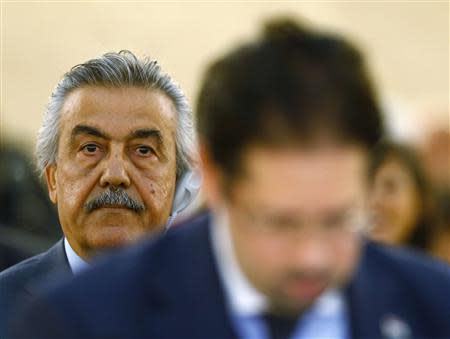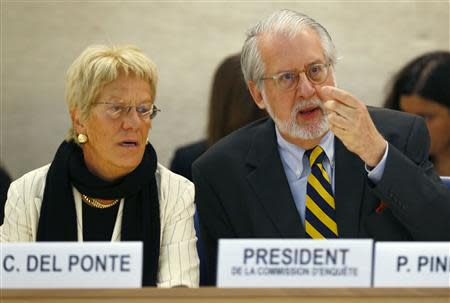Rebels, foreign fighters step up crimes in Syria: U.N.
By Stephanie Nebehay GENEVA (Reuters) - Hardline Syrian rebels and foreign fighters invoking jihad, or holy war, have stepped up killings, executions and other abuses in the north since July, U.N. human rights investigators said on Monday. There were now a number of brigades made up entirely of non-Syrians, the experts added, underlining how the 2-1/2-year-old conflict has pulled in neighboring countries and widened sectarian faultlines across the region. The investigators had previously said gunmen from more than 10 countries, including Afghanistan and Russia's Chechnya region, as well as al Qaeda-linked al Nusra forces, were backing Syria's mostly Sunni Muslim rebels. "Now it is probably more. The point is that these extreme elements have their own agenda and certainly not a democratic agenda that they are seeking to impose," investigator Vitit Muntarbhorn told Reuters. "That is a major worry from our side of the fence." One of the most active foreign forces was Al Muhajireen, Paulo Pinheiro, head of the inquiry, told the U.N. Human Rights Council, referring to a group whose name means 'the emigrants'. Lebanon's Shi'ite Muslim Hezbollah militia has been fighting alongside Syrian government forces. The growing involvement of foreign, Islamist fighters has added to Western reluctance to step in or arm the rebels. "Across northern Syria, there has been an upsurge in crimes and abuses committed by extremist anti-government armed groups along with an influx of rebel foreign fighters," Pinheiro said. His team was still investigating accounts of killings of captured government soldiers in Khan Al-Asal, he added. HOSPITAL BOMBINGS DENIED Pinheiro, reporting on suspected war crimes by both sides since July 15, said President Bashar al-Assad's government had also continued a relentless campaign of air bombardment and artillery shelling across the country. His team had documented attacks by government forces in 12 of Syria's 14 provinces in the past two months, with shelling particularly intense in Damascus, Homs and Aleppo, he said. An incendiary bomb dropped from a government warplane on a school in the Aleppo countryside on August 26 killed at least eight students, and 50 more suffered horrific burns over up to 80 percent of their bodies, he said, citing survivor accounts. Syria's ambassador Faysal Hamoui Khabbaz rejected the report on Monday and accused the commission of inquiry of "continuing politicizing and exaggeration". He denied that the inquiry's earlier charge that the government had bombed hospitals, adding: "There is no country that would destroy its own infrastructure." But Western diplomats called for perpetrators to face criminal justice for violations committed during the civil war. "We condemn the atrocities committed by the Syrian regime which, in accordance with your reporting, amount to crimes against humanity and war crimes under the Rome Statute of the International Criminal Court," said EU ambassador Mariangela Zappia in a speech. Since being set up two years ago in Geneva, the U.N. commission of inquiry has compiled three lists of suspects implicated in war crimes and crimes against humanity, according to Muntarbhorn, a veteran U.N. rights expert from Thailand. He gave no further details on the lists. "We are still vested with the authority to look into the question of who is responsible in terms of human rights violations generally as well as pertaining to chemical weapons," Muntarbhorn said in an interview. "We aren't able to say at this point in time which chemical agents nor which delivery systems nor who is responsible," he added. Pinheiro said that his team was still investigating the alleged use of chemical weapons in Syria, and awaited a separate report to be issued later in the day by U.N. inspectors led by Ake Sellstrom. "The use of chemical weapons is a war crime. There no dispute about that," he told a news conference. (Reporting by Stephanie Nebehay; Editing by Andrew Heavens)



